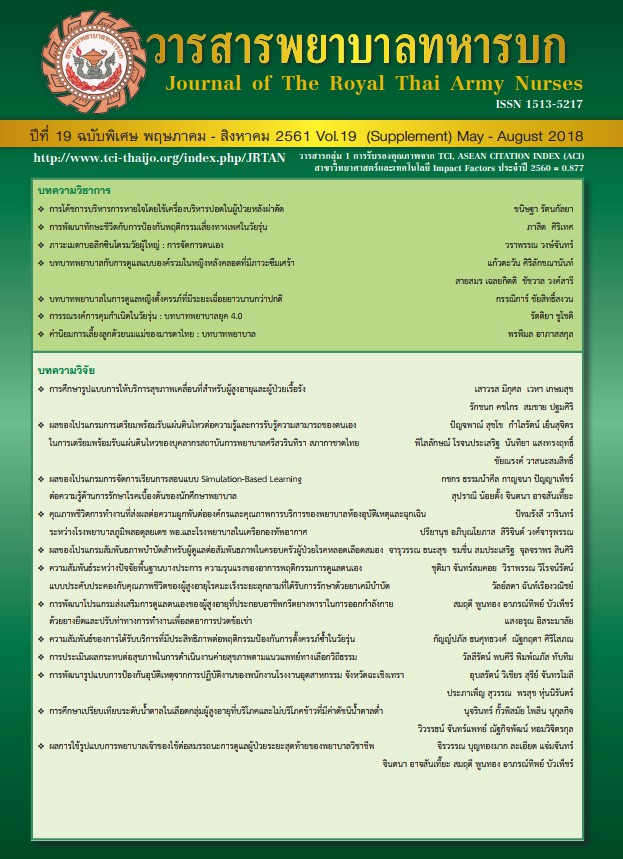The Effect of Teaching Simulation-Based Learning Program to The Knowledge in Basic Medical Care of Nursing students
Keywords:
Learning and teaching management, Simulation-Based Learning, knowledge in Basic Medical CareAbstract
This quasi-experimental research aimed to examine the effects of Simulation-Based Learning (SBL) Program to evaluate the knowledge in Basic Medical Care (BMC) of nursing students. The eighty of senior nursing students at Saint Louis College were simple random assigned in an experimental group (n = 40) and a comparison groups (n = 40). The experimental group was intervened a seven-week clinical teaching used SBL including lecture, Sim-Man 3G model, and physical examination. The comparison group was received regular study including lecture and physical examination. After fourteen weeks, the intervention group was evaluated the knowledge within before, after, and seventh-week follow up. Data were analyzed by using descriptive statistics, Independent t-test, Paired t-test and One-way Repeated Measures ANOVA. The finding revealed that the mean scores of knowledge in experimental group had significantly higher than those in the comparison group (p-value < .05). The knowledge of the experimental group among before, after, and seventh-week follow up had a significantly difference (F = 207.62, p-value <.05). The mean scores of knowledge after intervention and seventh-week follow up were significantly higher than before intervention (p-value <.05). The SBL can help nursing students to gain knowledge and clinical skills in BMC. This clinical teaching is recommended to teach in other nursing subjects.
Downloads
References
Faculty of Nursing, Saint Louis College. Bachelor of Nursing Science Program (Improvement curriculum, 2012). Bangkok: Faculty of Nursing, Saint Louis College; 2012. (in Thai)
Faculty of Nursing, Saint Louis College. Evaluation report of the stakeholder Satisfaction graduated from the Faculty of Nursing, Saint Louis College. Bangkok: Faculty of Nursing, Saint Louis College; 2016. (in Thai)
Thongcharoen V. et. al. Learning Outcomes of Work Integrated Learning in the Course of Practicum for Nursing Skills to Professional Readiness of Nursing Students. Journal of Nursing Science. 2013; 31(4): 79-89. (in Thai)
Sinthuchai S and Ubolwan K. Fidelity Simulation Based Learning: Implementation to Learning and Teaching Management. Journal of The Royal Thai Army Nurses. 2017; 18(1). 29-38. (in Thai)
Punthasee P and Sikaow O. The Effect of Clinical Teachinh by Using Case Studies on the Ability Development of Applying Nursing Process in
Clinical Practice of Nursing Students. Thai Journal of Nursing Council. 2009; 24(3): 81-93. (in Thai)
Kanhagilok S and Punsumreung T. Simulation Based Learning: Design for Nursing Education. Journal of Nursing and Education. 2016; 9(1): 1-14. (in Thai)
Jeffries PR. A framework for design, implement, and evaluation simulation used as teaching strategies in nursing. Nurs Educ Perspect. 2005; 26(2): 96-103.
Steinwachs B. How to Facilitate a Debriefing. SAGE Journals. 1992; 23(2): 186-195.
Krejcie R.V and Morgan D.W. Determining Sample Size for Research Activities. Educational and Psychological Measurement. 1970; 30(3): 607-610.
Liaw SY, Scherrpbier A, Rethans J, Klainin-Yobas P. Assessment for simulation Learning outcomes: A comparison of knowledge and self-reported confidence with observed clinical performance. Nursing Education Today. 2012; 32: e35-e39.
Dusit T.K. Fix fast fixes: Debriefing. Clinical Simulation in Nursing 2014; 10: 485-486.
Sinthuchai S, Ubolwan K, Boonsin S. Effect of high fidelity simulation based learning on knowledge satisfaction and self-confidence among the fourth year nursing students in comprehensive nursing care practicum. (research paper). Boromarajonani College of Nursing, Saraburi 2016; 71p. (in Thai)
Downloads
Published
How to Cite
Issue
Section
License
บทความหรือข้อคิดเห็นใดใดที่ปรากฏในวารสารพยาบาลทหารบกเป็นวรรณกรรมของผู้เขียน ซึ่งบรรณาธิการหรือสมาคมพยาบาลทหารบก ไม่จำเป็นต้องเห็นด้วย
บทความที่ได้รับการตีพิมพ์เป็นลิขสิทธิ์ของวารสารพยาบาลทหารบก
The ideas and opinions expressed in the Journal of The Royal Thai Army Nurses are those of the authors and not necessarily those
of the editor or Royal Thai Army Nurses Association.






